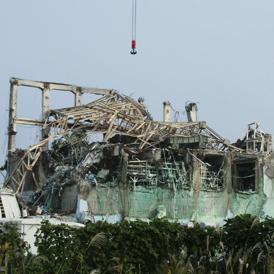New fission fears at Japan’s Fukushima nuclear site
Eight months on from the devastating tsunami and earthquake which sparked a nuclear crisis in Japan, an expert tells Channel 4 News new signs of fission at the plant are “a concern”.

On Wednesday, the plant operator of Japan‘s tsunami-ravaged Fukushima nuclear plant said it had found substances in a reactor which could be the result of nuclear fission.
The discovery is a possible setback in attempts to bring the damaged plant to a “cold shutdown”, when temperatures are stable below boiling point. The plant’s operator, Tokyo Electric Power (Tepco), has been battling to bring Fukushima under control since the tsunami hit and caused the nuclear accident almost eight months ago.
Reactors at the plant have been releasing small amounts of radiation into the atmosphere ever since, in the world’s worst nuclear accident since Chernobyl.
Get the latest from the Channel 4 News team on the ground in Japan, in our tsunami revisited live blog
Now there are concerns that the situation is worse than the authorities believed.
Tepco said it has discovered small amounts of xenon, a byproduct of fission, in the number two reactor at the plant and had poured in a mixture of water and boric acid, an agent that helps prevent nuclear reactions, as a precaution.
However, the operator played down the find, saying there was no evidence of a “criticality” in the reactor. The temperature and pressure at the reactor remained stable.

But nuclear expert John Large told Channel 4 News that any evidence of fission was a “concern” which raised problems for Tepco’s plans to make the plant safe by the end of the year.
He added: “It shows there are still considerable problems. It’s concerning because it shows they are not in total control of the nuclear processes in the plant – and even a small amount of fission is a concern because it can become a large amount of fission.”
Tepco said it was still assessing the data, but said it believes any fission was temporary and finished. The company has made progress in its battle with the problems at Fukushima, saying in October that the amount of radiation being emitted from the complex had halved from a month earlier.
It has also brought down temperatures at the three damaged reactors.
Following criticism of Tepco, Japan’s nuclear authorities and the government at the time of the incident for releasing information too slowly to the public, they are keen to now show that they are being as open as possible.
On Tuesday, to show that decontamination efforts were progressing, Japanese cabinet official Yasuhiro Sonoda drank a glass of purified water taken from the Daiichi plant after being challenged by journalists to prove it was safe.





